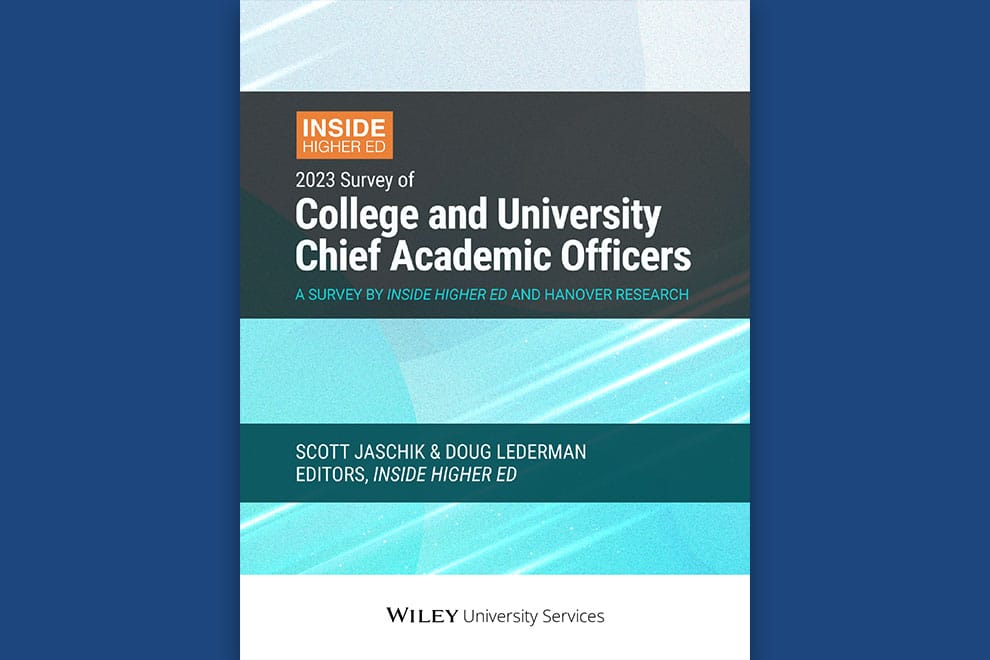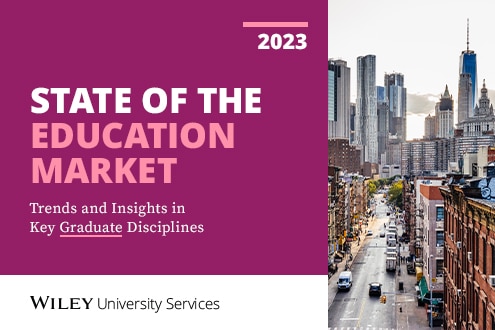Overall, online program enrollment has increased significantly, thanks to the pandemic initially driving the shift in modalities. And for some groups of students pursuing higher education, this shift has continued. In fact, more full-time MBA students are now enrolled in online programs than on-campus.
Graduate students’ needs are much different than undergraduates’ needs. Some students, especially those pursuing master’s degrees, doctorates, and PhDs, no longer prefer to attend university courses on-campus—they’re looking to complete courses online instead.
So, how can you encourage postgrads to enroll in your online program? Our Senior Directors of Enrollment Heather Brown and Bernard Carter have outlined four student recruitment strategies your university can implement to help make your program students’ top choice.
1. Develop a streamlined admissions process
From the start, the process needs to be easy. These postgrads are often working adults with families, jobs, and many other commitments. Investing substantial time into navigating complex university applications can be very frustrating and discouraging for them. But a reasonable application process can reflect that your university understands their unique challenges.
Simplify enrollment requirements where possible
During the pandemic, universities removed entrance exam requirements. Recently, some schools have brought them back, but many students don’t have time to take them. When a university requires a GMAT, it risks prospective students abandoning the application and looking for other online programs.
Remove impractical application steps
When a PhD candidate has already been working for 20 years, it’s not realistic for them to hunt down five letters of recommendation. As such, it’s important to remove application barriers and ensure every requirement brings value. Résumés are an appropriate way to evaluate prospective students without inconveniencing them, for example. Considerations like this demonstrate you understand learners and respect their time.
2. Champion flexibility
Online learners juggle a lot of responsibilities, so prospective students need to feel that your university’s programs maintain flexibility. A graduate student may manage work assignments and personal obligations, all while completing their thesis. Your university must ensure that faculty feel capable of supporting students’ learning, social, and emotional needs as they balance their work, school, and personal lives.
Prioritize asynchronous class sessions
Although many students choose to attend an online program close to where they live, they don’t want to be told when or if they need to go to campus. Some of them may rely on not having to attend regular class sessions on campus and prefer to learn material at their own pace when it’s convenient for their schedules.
For some students, it may never be an option to attend synchronous sessions. So, if faculty host synchronous meetings, your university should encourage them to provide flexible options, such as recorded lessons, to accommodate the needs of students who can’t attend.
Enjoying this article? Fill out our quick two-step form to stay up-to-date with our latest reports and infographics.

Design compact programs
These students also don’t want a long, drawn-out program since they likely have very specific goals that inspired them to continue their higher education. In fact, our 2022 Voice of the Online Learner report showed that 69% of learners want a program with a fast completion time.
“Online graduate students want to know two things: how much and how long. A university’s programs need to be reasonable on both,” says Heather Brown, Senior Director of Enrollment.
These students don’t have the same expectations about higher education as undergraduates. Shorter programs mean these postgrads can get started on reaching their goals faster, so your university must show willingness to meet students’ timing expectations and champion their ambitions.
3. Focus on affordability
We also found that 74% of online learners rate program tuition and fees as a very or extremely important factor in their decision. Especially right now, with high inflation, learners are worried about debt. Since cost can be such a significant barrier to prospective students, it’s key that your university is ready to help when possible.
Offer financial support when applicable
“We have seen some students this fall who made it all the way to the end of the process. They were registered and then, at the last minute, changed their mind. They are watching the state of the economy closely and are opting out of taking on any debt,” says Heather.
Efforts to lessen financial burdens, such as tuition discounts, scholarships, or waiving the cost of textbooks, are likely to motivate students to enroll in your program over another. For example, 31% of online learners said a scholarship for as little as $500 could encourage them to enroll in a program.
4. Emphasize alumni experiences and program outcomes
Collecting data on alumni accomplishments is a useful strategy for appealing to goal-minded students. For example, highlighting the average salary of graduates of your programs can help prospective students understand your role in preparing them to reach career goals.
“Students want to hear success stories. Universities should focus on getting in touch with their alumni and share the types of jobs they are working in,” says Bernard Carter, Senior Director of Enrollment.
Showing examples of alumni achievements can validate students’ interest in your program. They want to see that gaining skills in your program can position them for career success after receiving their degree.
Recruiting online graduate students can present challenges unique to their needs, but it’s not impossible.
We can help you form personalized connections with prospective students and reach your student recruitment goals. Learn more about our student recruitment services today.
About our authors
Heather Brown, Senior Director of Enrollment
Heather Brown began her career as an Enrollment Counselor after earning her bachelor’s degree in English from University of Kentucky. Since then, she has gained 21 years’ experience in higher education enrollment for both on-campus and online admissions. Heather has worked with over 80 colleges and universities, including public, private, regional, and for-profit universities. Throughout her career, her actions and insights have always been guided by her motto to “do what is in the best interest of the student.”
Bernard Carter, Senior Director of Enrollment
Bernard Carter has 13+ years’ experience in higher education student recruitment and vast experience in retail sales and leadership. During his time with us, he has driven innovations that enable our partners to help students reach their educational goals. As a former NFL player, Bernard is accustomed to working with teams in various capacities while striving to reach collective goals, and he never shies away from going the extra mile for our team, students, and partners.

















